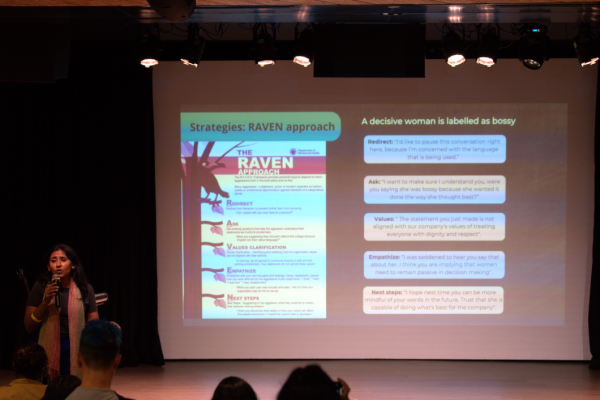-
Advocacy Theme
-
Tags
- Abortion
- Adoption
- Caregiving
- CEDAW
- Disability
- Domestic Violence
- Domestic Workers
- Harassment
- Healthcare
- Housing
- International/Regional Work
- Maintenance
- Media
- Migrant Spouses
- Migrant Workers
- Muslim Law
- National budget
- Parental Leave
- Parenthood
- Polygamy
- Population
- Race and religion
- Sexual Violence
- Sexuality Education
- Single Parents
- Social Support
- Sterilisation
- Women's Charter
What it takes to disrupt discrimination at work: Insights from IDEVAW 2024 (3/4)
December 18th, 2024 | Employment and Labour Rights, Events, Gender-based Violence, News, OLD Internal – For Admin Use Only, Workplace Harassment
By Athiyah Azeem
Are you automatically assigned more ‘submissive’ roles like taking notes or office housework? Dr. Annette S. Vincent asked this question to a group of people attending IDEVAW 2024—a full-day event on 30 November 2024 by AWARE where advocates and experts convened to talk about gender-based violence.
Many of the attendees, who were all femme-presenting, raised their hands. While someone who doesn’t experience this might think it is not a big deal, it is when it is a perpetual form of gender discrimination, Dr. Annette said; 20% of women report being made to do more office housework, like taking notes, than men. Dr. Annette calls this a microaggression.

“The underlying factor is that it communicates harm and discrimination towards minorities in our community, causing psychological, emotional and sometimes physical harm,” Dr. Annette said. Ultimately, due to the cumulative stress these ‘small’ incidences cause, it has a big impact.
“Even a side remark at your workplace about women…in the long run, it does create a scar,” Sairino, a long-time AWARE volunteer who attended the workshop, said to an AWARE representative. She hopes to see more public awareness of the impact of microaggressions at work.

There are ways that we can disrupt microaggressions. Dr. Annette calls on survivors and bystanders to use the R.A.V.E.N. framework: where they can redirect the conversation to address the offending language directly; ask the offender probing questions so the offender understands what they did wrong; clarify the workplaces’ shared values like trust, diversity and inclusion; emphasise their own thoughts and feelings about the microaggression; and offer concrete steps on how the offender can change their behaviour moving forward.
For example, if someone interrupts their female colleague while they are speaking, you can redirect the conversation by saying, “Hey, she wasn’t done speaking. I’d like to hear what she was going to say.”
“If we have the power and privilege to interrupt microaggression, then we should call it out,” Dr. Annette said.
This article is one in a four-part series on IDEVAW 2024. Click below to read the other aspects of gender-based violence that we tackled at the conference.
What it takes to stop deepfake nudes: Insights from IDEVAW 2024 (1/4)
What it takes to stop domestic violence: Insights from IDEVAW 2024 (2/4)



